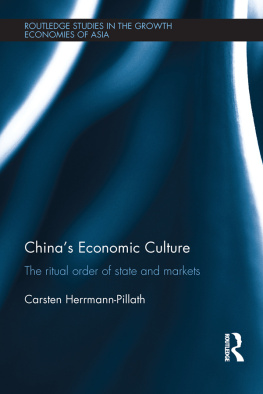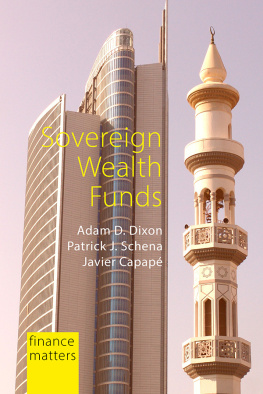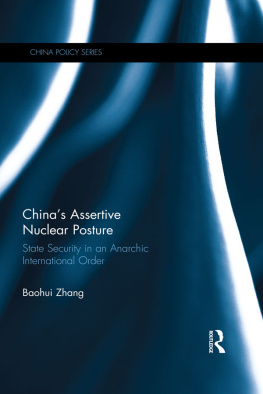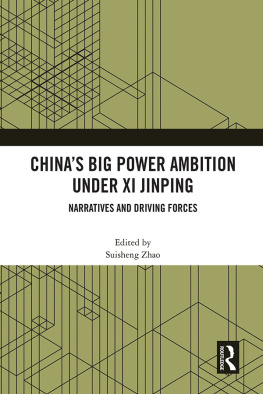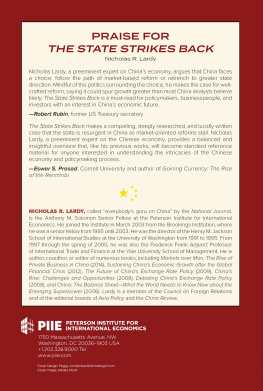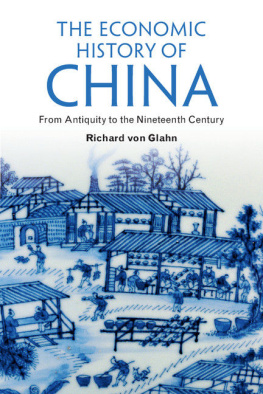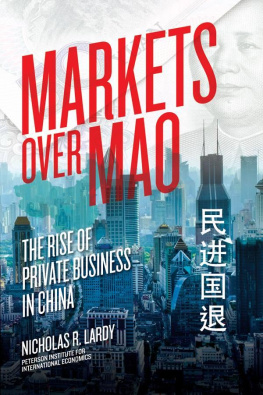
This book is an outstanding piece of work that combines profound knowledge of Chinas economic history with methodological creativity to establish a new paradigm, Chinas ritual economy. Drawing on an impressive amount of sources and tackling brilliantly the complex relationship between cultural tradition and economic behaviour, Herrmann-Pillath may have come up with the ultimate explanation of what Chinese capitalism in modern times is all about. A must-read!
Gunter Schubert, Professor of Greater China Studies, University of Tbingen, Germany
Rituals are fundamental institutions, but often ignored by people. Apart from researching on rituals as classics, most scholars know little about them. In this book, Professor Herrmann-Pillath gives us a key to understanding Chinas business culture, which is to regard rituals or customs as the behavior patterns which still exist fundamentally and universally in modern society. To understand rituals or customs is more important than to understand written laws, if one would like successful commercial cooperation in China. Meanwhile, this analysis develops a new, correct research approach academically.
Sheng Hong, Unirule Institute of Economics, Beijing, China
This is a very thought provoking and important book. It takes a big step towards a more systematic understanding of Chinese economy and society by unfolding the bold hypotheses of understanding the process of modernization in China in terms of ritual. It is unusual by its interdisciplinary approach combining anthropology and philosophy with economics. It puts Chinas present into the context of Chinas past and thus transgresses the border between those who focus on modern China and those who strive to understand ancient China.
Susanne Weigelin-Schwiedrzik, Professor of Sinology, University of Vienna, Austria
This work is an exemplary study in the tradition of Max Weber and Karl Polanyi yet going beyond these Old Masters in its theoretical ambition and analytical scope. Carsten Herrmann-Pillath demonstrates beyond any doubt that no one can understand Chinas economy (everything from family firms to state-owned enterprises to macroeconomic policies) without investigating the entire cultural-institutional package that comes with it. In China economic practices are not simply embedded in culture; they are the culture. The economist can do no worse than embracing theoretical insights from anthropology, sociology and cultural history, and as a result better grasp the style of any particular economic culture. This book provides the methodological roadmap for this kind of genuinely multi-disciplinary work. Highly recommended for students of China, economists as well as intellectually-oriented executives.
Adam Yuet Chau, University Senior Lecturer in the Anthropology of Modern China, University of Cambridge, UK
Chinas Economic Culture
Chinas spectacular rise challenges established economic moulds, both at the national level, with the concept of state capitalism, and at the firm level, with the notion of indigenous Chinese management practices. However, both Chinese and Western observers emphasize the transitional nature of the reforms, thereby leaving open the question as to whether Chinas reform process is really a fast catch-up process, with ultimate convergence to global standards, or something different. This book, by a leading economist and sinologist, argues that culture is an exceptionally useful tool to help understand fully the current picture of the Chinese economy. Drawing on a range of disciplines including social psychology, cognitive sciences, institutional economics and Chinese studies, the book examines long-run path dependencies and cultural legacies, and shows how these contribute crucially to the current cultural construction of economic systems, business organizations and patterns of embedding the economy in society and politics.
Carsten Herrmann-Pillath is Permanent Fellow of the Max Weber Centre for Advanced Cultural and Social Studies, Erfurt University, Germany, Research Professor of Economics and Evolutionary Sciences, Witten/Herdecke University, Germany, and a Distinguished Visiting Professor of Schwarzman Scholars at Tsinghua University, China.
Routledge Studies in the Growth Economies of Asia
Intellectual Property Valuation and Innovation
Towards global harmonisation
Edited by Ruth Taplin
Marketing and Consumption in Modern Japan
Kazuo Usui
Economic Growth and Employment in Vietnam
David Lim
Asian Financial Integration
Impacts of the global crisis and options for regional policies
Edited by Yiping Huang and Shiro Armstrong
Informal Labour in Urban India
Three cities, three journeys
Tom Barnes
Business Leadership Development in China
Shuang Ren, Robert Wood and Ying Zhu
Women, Labour and the Economy in India
From migrant menservants to uprooted girl children maids
Deepita Chakravarty and Ishita Chakravarty
Negotiating Financial Agreement in East Asia
Surviving the turbulence
Kaewkamol Karen Pitakdumrongkit
Managing Cyber Risk in the Financial Sector
Lessons from Asia, Europe and the USA
Edited by Ruth Taplin
Chinese Economic Diplomacy
Shuxiu Zhang
Chinas Iron Ore Boom
Luke W.L. Hurst
Economic Change In Asia
Implication for corporate strategy and social responsibility
Edited by M. Bruna Zolin, Bernadette Andreosso-OCallaghan and Jacques Jaussaud
Chinas Economic Culture
The ritual order of state and markets
Carsten Herrmann-Pillath
Chinas Economic Culture
The ritual order of state and markets
Carsten Herrmann-Pillath

First published 2017
by Routledge
2 Park Square, Milton Park, Abingdon, Oxon OX14 4RN
and by Routledge
711 Third Avenue, New York, NY 10017
Routledge is an imprint of the Taylor & Francis Group, an informa business
2017 Carsten Herrmann-Pillath
The right of Carsten Herrmann-Pillath to be identified as author of this work has been asserted by him in accordance with sections 77 and 78 of the Copyright, Designs and Patents Act 1988.
All rights reserved. No part of this book may be reprinted or reproduced or utilized in any form or by any electronic, mechanical, or other means, now known or hereafter invented, including photocopying and recording, or in any information storage or retrieval system, without permission in writing from the publishers.
Trademark notice: Product or corporate names may be trademarks or registered trademarks, and are used only for identification and explanation without intent to infringe.
British Library Cataloguing-in-Publication Data
A catalogue record for this book is available from the British Library
Library of Congress Cataloging in Publication Data
Names: Herrmann-Pillath, Carsten, author.
Title: China's economic culture : the ritual order of state and
markets / Carsten Herrmann-Pillath.
Description: Abingdon, Oxon ; New York, NY : Routledge, 2017. |
Series: Routledge studies in the growth economies of Asia ; 133 |
Includes bibliographical references and index.
Identifiers: LCCN 2016017515| ISBN 9780415711272 (hardback) |
Next page
